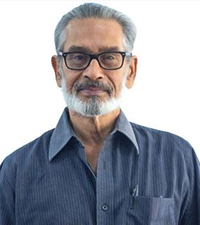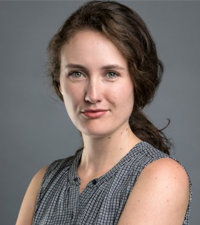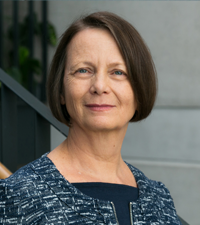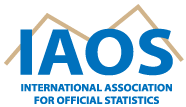

Misuse of Statistics: Time to Speak Out
Webinar – 22nd February 2021 from 9.00 – 11.00 EST
You can watch the recording of this event.
Introduction
The United Nations Statistical Commission is meeting during an unprecedented time for official statistics. The coronavirus pandemic has thrown into sharp focus the need for trustworthy information to guide decision making and enable citizens to understand issues that affect their health and livelihoods. The impact of misuse of statistics or false statistics has also been apparent.
This event is a call to action at the national, regional and global level: where there is misuse of statistics it is time to speak out. The event will build on the webinar hosted by the International Association for Official Statistics (IAOS) on 6 October 2020.
The aim is to examine the issues raised from diverse perspectives and propose solutions to an issue that matters greatly to all members of the Statistical Commission and is relevant to many of the items on the agenda for the 52nd meeting. A number of papers on this topic will also be published in the March issue of the Statistical Journal of the IAOS (SJIAOS).
The webinar will take place on 22nd February 2021 from 9.00 – 11.00 EST. A series of speakers will introduce the topic and there will be an opportunity for questions and comments from participants. An open debate will also be live from the day of the event on the SJIAOS discussion platform on www.officialstatistics.com.
Background
The Fundamental Principles of Official Statistics are a pillar of the Global Statistical System and guide the work of the United Nations Statistical Commission. The current pandemic, occurring alongside the decade for action on the Sustainable Development Goals, has brought into sharp focus the critical importance of trustworthy official statistics that meet the requirements of the Fundamental Principles. Official statistics are needed to guide action, help save lives and chart our progress towards a future in which no one is left behind.
A particular feature of the current climate is the danger of false statistics. These may be the result of an inadequate design, implementation or communication or a deliberate attempt to deceive in order to serve a vested interest. The result is poorer decisions and therefore lost lives, weaker economies, less just societies and a future for our children that is not as sustainable as it could have been. Fundamental Principle 4 states that the statistical agencies are entitled to comment on erroneous interpretation and misuse of statistics. In recent year this Principle has resulted in a variety of actions and, as the data landscape has evolved, so too has the response.
The event will hear from leading figures from around the world with diverse perspectives on the issues related to misuse of statistics. There will an opportunity for open discussion and a focus of exploring potential future actions by the Statistical Commission and others. The event is being organised by the International Association for Official Statistics in conjunction with the International Statistical Institute.
Speakers
Chair:
- John Pullinger, President of the International Association for Official Statistics
Contributors
- Jennifer Saul, Waterloo Chair in Social and Political Philosophy of Language
- Dr. Pronab Sen, Country Director, International Growth Centre’s India Programme, and Editor, Indian Journal of National Income & Wealth.
- Kate Wilkinson, the deputy chief editor at Africa Check
- Regina Ammicht Quinn, professor of ethics with the International Center of Ethics in the Sciences and Humanities at the University of Tuebingen and the executive director of the Centre
With interventions from
- Hernán Muñoz, the former National Director of Planning, Institutional and International Relations of the National Institute of Statistics and Census (INDEC) of Argentina
- Andreas V Georgiou, Visiting Lecturer and Visiting Scholar at Amherst College, USA, where he teaches courses on statistical ethics and institutions and on macroeconomic programming
- Pali Lehohla, the former Statistician-General of South Africa, a position he held from 2000 up to 2017.
- Vincent F. Hendricks, Professor of Formal Philosophy at The University of Copenhagen
- Ed Humpherson, head of the UK Office for Statistics Regulation
- Martine Durand, OECD Chief Statistician and Director of Statistics and Data until end 2019
Registration
You can watch the recording of this event.
You can read the papers:
Biographies of Speakers
Chair
John Pullinger

John Pullinger is President of the International Association for Official Statistics, member of the Board of the Global Partnership for Sustainable Development Data, trustee of the Nuffield Foundation and Visiting Professor at Imperial College He was previously UK National Statistician, President of the Royal Statistical Society, Chair of the United Nations Statistical Commission and Librarian and Director General for Information Services at the UK House of Commons. He is a graduate of the University of Exeter and of Harvard Business School. He has been awarded honorary degrees by the universities of Exeter, Essex and the West of England and is a Fellow of the Academy of Social Sciences.
Contributions
Jennifer Saul

Jennifer Saul is Waterloo Chair in Social and Political Philosophy of Language. Before this, she was Professor of Philosophy at the University of Sheffield, where she also served as Head of Department 2012–2016. She was President of the Mind Association (2019-2020) and Director of the Society for Women in Philosophy UK (2009-2019), and in 2011 was named Distinguished Woman Philosopher by the American Philosophical Association. She is author of several books with Oxford University Press, including Lying, Misleading and What Is Said (2012). Her current research concerns deceptive and manipulative political speech.
Dr. Pronab Sen

Dr. Pronab Sen is Country Director, International Growth Centre’s India Programme, and is Editor, Indian Journal of National Income & Wealth. He is also a member of the High-level Expert Group on Measurement of Economic Performance and Social Progress (OECD) and the Technical Advisory Group of the International Comparison Project (World Bank). Previously he was Chairman of the National Statistical Commission, the first Principal Economic Adviser at India’s Planning Commission, the first Chief Statistician of India, and Secretary, Ministry of Statistics & Programme Implementation. He was the principal author and coordinator of three Five Year Plans and Mid-term Appraisals. He has chaired a number of government Committees, most notably on Economic Statistics, Ecological Fragility, Control of Prices of Essential Drugs, and Slums. Dr. Sen received his B.A. (Hons) in Economics from St. Stephen’s College, University of Delhi (1972); M.B.A. (1974) and M.A. in Economics (1975) from the George Washington University; and Ph.D. in Economics (1982) from the Johns Hopkins University.
Kate Wilkinson

Kate Wilkinson is the deputy chief editor at Africa Check, the continent’s leading fact-checking organisation. She leads the organisation’s work on artificial intelligence and WhatsApp-based fact-checking. Kate is the co-host of “What’s Crap on WhatsApp?”, an award-winning WhatsApp-based fact-checking podcast. Her work involves training African journalists on verification and research techniques. In 2018, she discovered an error in the South African police service’s annual crime statistics, which led to an official revision. Her main research areas include education, migration, crime and viral social media hoaxes. Find her on Twitter: @kateomega
Regina Ammicht Quinn

Regina Ammicht Quinn is professor of ethics with the International Center of Ethics in the Sciences and Humanities at the University of Tuebingen and the executive director of the Centre. She also is director of the Centre for Gender- and Diversity Research, also at the University of Tuebingen. She is member of the steering committee of “Lernende Systeme – Germany’s Platform for Artificial Intelligence“ (Ministry of Education and Research), the ministry’s consultant for research in issues of security and member of the steering committee for the cluster of excellence “Machine Learning – New Perspectives for Science“. Her studies included theology and literature, she is interested in cultural and technological change and a strong proponent for interdisciplinary research and mindsets.
With interventions from:
Hernán Muñoz
Hernán Muñoz is the former National Director of Planning, Institutional and International Relations of the National Institute of Statistics and Census (INDEC) of Argentina. He was part of the management team, led by Jorge Todesca, which rebuilt and reformed the Argentine Statistical System as of 2015, an internationally recognized experience presented at past IAOS Congresses. During his time at INDEC, he had an active participation in the statistical community, as part of the Friends of the Chair Group on the Fundamental Principles of Official Statistics of the UNSC and member of the UN HLG-PCCB for the 2030 Agenda for Sustainable Development. He is an economist and currently collaborates with the Centro de Pensamiento Estratégico Internacional (Cepei), a global south think tank that advocates for statistical capacity building.
Andreas V Georgiou
Andreas V Georgiou is a Visiting Lecturer and Visiting Scholar at Amherst College, USA, where he teaches courses on statistical ethics and institutions and on macroeconomic programming. From 1989 until 2010 he worked at the International Monetary Fund, holding positions in various departments. In 2010, he returned to Greece to head the newly established Hellenic Statistical Authority (ELSTAT) – the recast National Statistics Office of Greece – and align it fully with European law and international statistical principles. He was President of ELSTAT for five years. He is currently serving as an elected member of the Council of the International Statistical Institute and a member of the Committee on Professional Ethics of the American Statistical Association. He has a BA from Amherst College and a PhD in Economics from the University of Michigan. He has written on institutional and legal frameworks for national and supranational statistical systems, on financial crises and on macroeconomic programming.
Pali Lehohla
Pali Lehohla is the former Statistician-General of South Africa, a position he held from 2000 up to 2017. He has served as co-chair of PARIS21 and the Chair of the United Nations Statistics Commission. He was the founding chair of the Statistics Commission of Africa (StatCom Africa) and chairs the African Symposium for Statistical Development (ASSD). He was the Vice President of the International Statistics Institute (ISI), and sponsors the Young African Statistician (YAS) movement. He served as one of on the twenty five member panel on Data Revolution appointed by the UN Secretary General, and was a member of the Independent Accountability Panel for the health of women, children and adolescents. Dr Lehohla has been a forceful advocate for improving the Civil Registration and Vital Statistics systems in Africa. He consulted extensively in the in conflict, out of conflict and fragile states on matters statistics. And this saw him cover Iraq, Afghanistan, Sudan and Cambodia to make some mention. He is the Founder of the Pan African Institute for Evidence (PIE).
Vincent F. Hendricks
Vincent F. Hendricks is Professor of Formal Philosophy at The University of Copenhagen. He is Founder and Director of the Center for Information and Bubble Studies (CIBS) sponsored by the Carlsberg Foundation and was awarded the Elite Research Prize by the Danish Ministry of Science, Technology and Innovation and the Roskilde Festival Elite Research Prize both in 2008. He was Editor-in-Chief of Synthese: An International Journal for Epistemology, Methodology and Philosophy of Science between 2005-2015. His recent book Reality Lost: Markets of Attention, Misinfomation and Manipulation about the advent of fake news is available for free with Springer Nature Open Access. Go here for free download.
Ed Humpherson
Ed Humpherson was appointed as Director General for Regulation in October 2013 and took up post in January 2014. He is head of the Office for Statistics Regulation which provides independent regulation of all official statistics in the UK. The aim of OSR is to enhance public confidence in the trustworthiness, quality and value of statistics produced by government. Prior to joining the Authority, Ed was a Board Member and Executive Leader for Economic Affairs at the National Audit Office, a post he held since July 2009. This role included responsibility for the overall strategic direction of NAO’s work on economic affairs. Ed Humpherson was educated at the University of Edinburgh. Ed is a Chartered Accountant and a member of the Institute of Chartered Accountants in England and Wales.
Martine Durand
Martine Durand was the OECD Chief Statistician and Director of Statistics and Data until 31st December 2019. In this capacity, she was responsible for providing strategic orientation for the Organisation’s statistical policy and statistical activities. She was the leader of the OECD Better Life Initiative launched in 2011 and was responsible for the Organisation’s work on the measurement of people’s well-being and societal progress, promoting the use of wellbeing and sustainability indicators for policy-making. She also initiated the OECD Smart Data Strategy. Prior to that, she was Deputy-Director in the Employment and Social Affairs Directorate and held the position of Deputy-Head of the OECD Secretary-General’s Private Office. Ms. Durand also worked for many years as a senior economist in the OECD Economics Department. Ms. Durand is a member of several statistics and economics advisory bodies. She graduated in mathematics, statistics and economics from the Paris VI University, the Ecole Nationale de la Statistique et de l’Administration Economique (ENSAE) and the University of Wisconsin-Madison.

